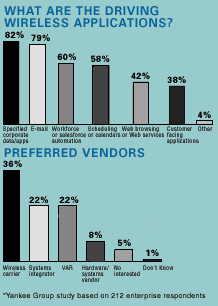Sprint Readies 2.5G
Sprint's introduction will mark the first time a carrier is expected to offer 2.5G wireless service across its entire coverage area. Several solution providers told CRN that Sprint plans to unveil its service, based on CDMA 1xRTT technology, in July.
A Sprint spokeswoman declined to comment on a specific rollout date, beyond reiterating the carrier's existing commitment to launch the service by midsummer.
If Sprint can deliver on its promises, it will be the first service provider to offer packet-based wireless data service at average speeds of 50 Kbps to 70 Kbps, and at peaks of up to 144 Kbps everywhere the carrier currently offers cellular telephone coverage.

Although Sprint is a late entry to the next-generation wireless data market, the company is expected to launch with coverage in more cities than competitors Verizon Wireless, AT&T Wireless and VoiceStream Wireless, said solution providers.
Sprint's coverage aspirations are noteworthy because the carrier's rivals thus far have launched service in regional pockets across the United States. By offering only regional coverage, carriers make it difficult to accommodate national accounts and SMB customers with employees who travel, said Eric Tuttle, director of network solutions at Bloomington, Ill.-based Comark, a Sprint partner recently acquired by Insight Enterprises.
Aside from coverage concerns, other factors that could negatively impact the acceptance of 2.5G wireless services include pricing, disparate channel programs and the growing proliferation of Wi-Fi wireless network technology, said solution providers.
Pricing is one of the largest sticking points, they said, noting that most carriers charge per Kbyte for wireless data,a potential barrier for price-conscious businesses.
"We have a huge focus on [next-generation wireless and will roll out nationwide this summer," said Net Payne, director of business marketing at Sprint. "We will not price ourselves out of market."
Solution providers expect Sprint to try to beat competitors' pricing, but it's unlikely the carrier will submit to the "all-you-can-eat" type pricing that the industry expects.
"Because most plans are open-ended, companies will need to be careful how they use the services or they will have sticker shock at the end of the month," said Craig Mathias, principal at the Farpoint Group, a mobile consultant and integrator in Ashland, Mass.
A flat monthly fee for wireless data would be the best-case scenario, solution providers said. "That's absolutely huge," said Tuttle. "I think eventually we will get to the point that carriers will realize they have to do that."
To address price considerations, solution providers said they will lean heavily on return on investment arguments. "We've always said customers should never make a decision based on price," said Mathias. "Instead, they have to look at ROI."
Tuttle said the fatter pipe inherent in 2.5G networks can be used to help demonstrate ROI for wireless data solutions. For example, he said the insurance industry has been waiting for faster throughput so claims adjusters can investigate accidents and then transmit data and photos directly from the site.
"Insurance companies told us their adjusters can write two to three times the amount of claims per day if they didn't have to wait until the end of the day to send information back to a corporate location," Tuttle said.
Aside from resolving pricing concerns, carriers will also need to address the commission structure for wireless activations, said solution providers.
Carrier compensation varies widely between companies,solution providers said they make anywhere from $20 to $250 for activations. As wireless services mature, solution providers said they will look for stronger commitments from carriers.